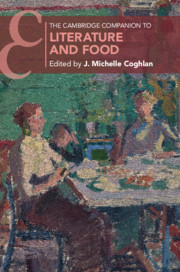Book contents
- The Cambridge Companion to Literature and Food
- The Cambridge Companion to Literature and Food
- Copyright page
- Contents
- Illustrations
- Contributors
- Acknowledgments
- Chronology of Major Works and Events
- Introduction: The Literature of Food
- 1 Medieval Feasts
- 2 The Art of Early Modern Cookery
- 3 The Romantic Revolution in Taste
- 4 The Matter of Early American Taste
- 5 The Culinary Landscape of Victorian Literature
- 6 Modernism and Gastronomy
- 7 Cold War Cooking
- 8 Farm Horror in the Twentieth Century
- 9 Queering the Cookbook
- 10 Guilty Pleasures in Children’s Literature
- 11 Postcolonial Tastes
- 12 Black Power in the Kitchen
- 13 Farmworker Activism
- 14 Digesting Asian America
- 15 Postcolonial Foodways in Contemporary African Literature
- 16 Blogging Food, Performing Gender
- Selected Guide to Further Reading
- Index
- Cambridge Companions to Literature
14 - Digesting Asian America
Published online by Cambridge University Press: 17 March 2020
- The Cambridge Companion to Literature and Food
- The Cambridge Companion to Literature and Food
- Copyright page
- Contents
- Illustrations
- Contributors
- Acknowledgments
- Chronology of Major Works and Events
- Introduction: The Literature of Food
- 1 Medieval Feasts
- 2 The Art of Early Modern Cookery
- 3 The Romantic Revolution in Taste
- 4 The Matter of Early American Taste
- 5 The Culinary Landscape of Victorian Literature
- 6 Modernism and Gastronomy
- 7 Cold War Cooking
- 8 Farm Horror in the Twentieth Century
- 9 Queering the Cookbook
- 10 Guilty Pleasures in Children’s Literature
- 11 Postcolonial Tastes
- 12 Black Power in the Kitchen
- 13 Farmworker Activism
- 14 Digesting Asian America
- 15 Postcolonial Foodways in Contemporary African Literature
- 16 Blogging Food, Performing Gender
- Selected Guide to Further Reading
- Index
- Cambridge Companions to Literature
Summary
When it comes to food and race, the connection is often one of identity: how the one comes to stand in for the other and vice versa. This chapter invites readers to theorize food and consumption in Asian American literature by attending to food, not as an expression of identity, but as that which profoundly destabilizes (and perhaps even dissolves) identity and by questioning the association between food as matter and race as matter. It focuses on the tropes of ingestion, farming, and environmental and human health in On Such a Full Sea, Chang-rae Lee’s most and least Asian American novel, as a way to meditate on the nature of racial/ethnic (im)materiality. By turning to the crises of food and ecology as sites that trouble the division between the human and the animal, the consumer and the consumed, Lee forces us to reconsider our easy assumptions about racial-ethnic identity and the corporeal integrity that presumably substantiates that identity.
Keywords
- Type
- Chapter
- Information
- The Cambridge Companion to Literature and Food , pp. 215 - 227Publisher: Cambridge University PressPrint publication year: 2020
- 1
- Cited by

